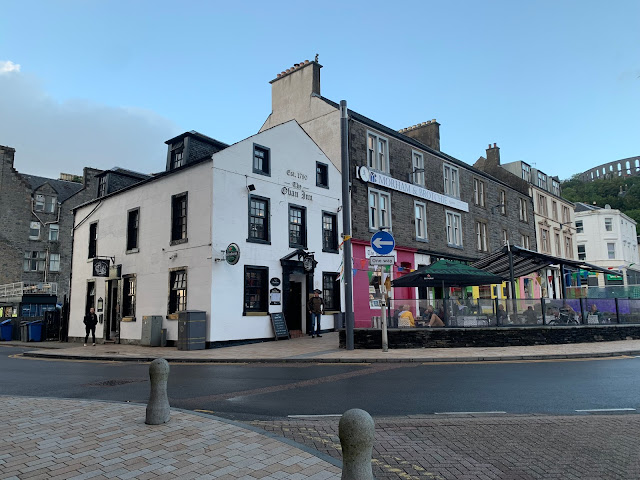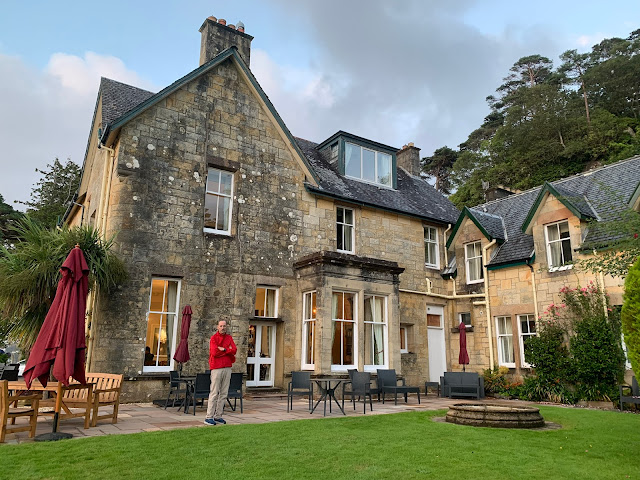I have no idea how many times I have had heard, "Life is a journey, not a destination." The point of this particular bromide, as far as I can tell, is that we should not be concerned with where we are going but only enjoy how we are getting there. I doubt if people who say things like that have ever flown on Frontier Airlines. And I cannot imagine that they have ever had to deal with Scottish CityLink buses. But more on all of that a bit.
The day, miserable as it would later be, began wonderfully enough at the Hotel du Vin. John and I had a fabulous breakfast and then, as we went back to the room to pack, took some valedictory photos of this well-preserved Victorian building. We particularly loved the stained glass
and the entryway tile floors,
perhaps because the renovations to our Ashland home will have both of these features, although in a different form and style.
Now, back to the misery of travel. We will be catching our of cruise of the Inner Hebrides in Oban, about two hours north of Glasgow, and my original plan was for us to take the train there. All the guidebooks agree that it is a particularly scenic train ride. But the guidebooks fail to mention that here in the UK rail workers seem to strike constantly. And about two days ago we were all warned that effective today there would be a four-day work stoppage. I had to find some other way to get to Oban.
And there was only one other way, and that was the bus. Now you may be thinking, "Oh, it can't be that bad." You have probably been deceived by all those Rick Steves shows where he steps on a shiny, uncrowded coach, the camera crew carefully hidden, and says some happy little thing like, "When I'm in Scotland I love to take the bus. It is inexpensive and you meet so many wonderful local people." Rick Steves did not take bus 975 to Oban.
Unlike the spanking brand-new Hannon coach next to us, headed toward Belfast, equipped with reclining seats and Wi-Fi, our bus probably dated to when John Major was still Prime Minister, and its only amenity was a bathroom in the back that I noticed absolutely no one even attempted to use. And poor John - there was less legroom here than in United Basic Economy class. Our fellow passengers all had the sullen look of people who have been forced to go to the DMV without an appointment. Not at all Rick Steve's happy locals telling you about how much they love where they live.
The day was overcast, and the scenery disappointingly dull. We passed by Loch Lomond on our way, and far from the romantic spot I had imagined singing the song as a child, I discovered that it looked like just about any hydroelectric project in California.
"Yon bonnie banks," indeed. In fact, one of the things I noticed as we went through this area is that there is a surprising amount of logging going on. The forested areas are not natural, but all feature the same kind of conifers planted in neat little rows, all waiting until they are tall enough to be cut.
It was just after Loch Lomond that things turned really bad for us. The bus pulled over and the driver announced a stop for a quick break. It was right by a little café, and presumably people would be using the restroom there. I am not quite sure why, but I decided to stay on the bus. John needed to go to the bathroom and he walked off along with about half of the passengers. About seven or eight minutes later, I noticed them all coming back. They all seemed in a hurry. I did not see John. I tried calling him, but he did not answer. A moment later, the bus took off, leaving John behind.
I rushed to the front to talk to the driver. "My partner's still back there," I told him.
He obviously did not care. In a thick Glasgow accent I could not possibly write phonetically, he said, "Well, that's too bad. He'll have to catch the next bus. I just said long enough for a pee or a smoke."
I told him that John had disabilities, knowing that in the US this could turn into an entire legal incident. He obviously did not care. "He'll have to take the next bus."
"Well," I said, "then I will take the next bus too. Let me off."
At this point, my fellow passengers, far from the charming locals that Rick Steves deals with, became hostile to me. "I've got to catch a ferry," one old bitch snapped. But I think that the driver had to let me off if I demanded that, so he opened the door and luggage bay.
I saw John as I started to take our bags out as slowly as I could. "He's almost here," I called to the driver.
For whatever reason, the driver softened. "Just put your bags back and get on board." But as we found our way back to our seats all I could focus on was the hateful look on that on the shrew's face. I hope to hell she missed her ferry.
We finally pulled into Oban, about 30 minutes later. Most of that lost time had nothing to do with me, however, and a lot more with heavy traffic on a route originally designed for horses. I should pause here, dear reader, in case you come to Scotland, so you can pronounce town correctly. You have probably been reading it as "Oh-bahn." This will get you immediately corrected. Instead, purse your lips as if you were going to kiss your dog. Hold out a long o for a long time. It should sound sort of like a German vowel at this point. Immediately add a "b" and an "n" with no vowel in between them. "OHHH-b-n." Now you're talking like a Scot.
Oban was apparently just an ordinary little fishing village until Caledonian MacBrayne ferries -- just "CalMac" to most Scots -- decided to make it a hub of their operations. A rail line from Edinburgh and Glasgow allowed thousands of Scots to take the train and the ferry and to have a holiday in the Hebrides. Dozens of small hotels were built along the shore to house them on their way to or from the islands. Most of them are still working hotels, though the deteriorating late Victorian buildings all have a kind of ominous quality about them to me, and I thought of all those illustrations in "Series of Unfortunate Events" novels my students used to like to read.
But the waterfront is lovely,
and there are a few of the building left from a pre-Victorian Oban.
John and I are staying at the edge of town in a hotel that was once the summer cottage of the Duke of Argyll. It's not quite as grand as that may sound, I suspect that the Duke was perhaps pretty minor nobility, despite the impressive title. But it's a nice house, probably dating, I would guess, from about 1910.
We have a really nice view of the town and Oban harbor from our room.
Even though it's late in the season, the town is still quite full and we were advised by our innkeeper that all the decent restaurants were booked solid. So we walked into town and had some mediocre pub fare. But we did enjoy seeing and talking to the locals here. Maybe Rick Steves is occasionally right.








